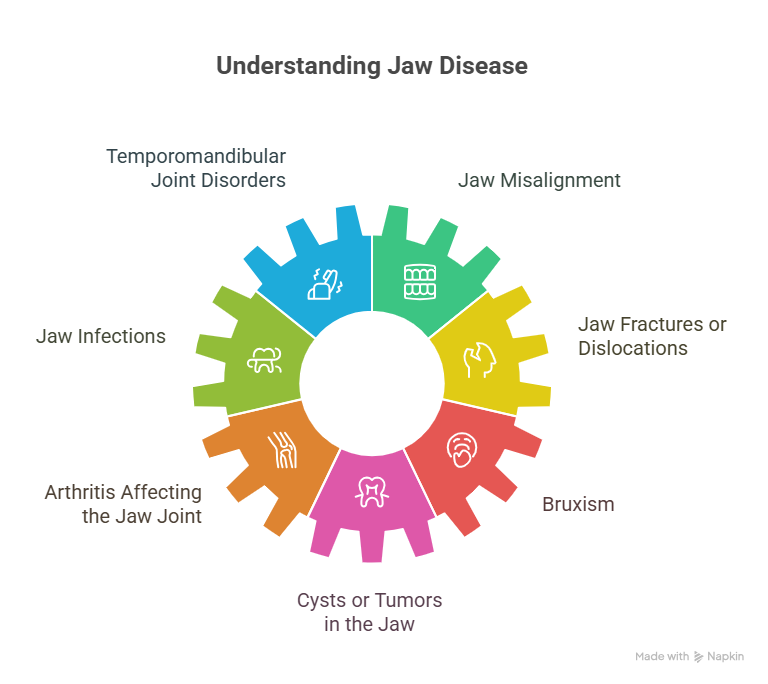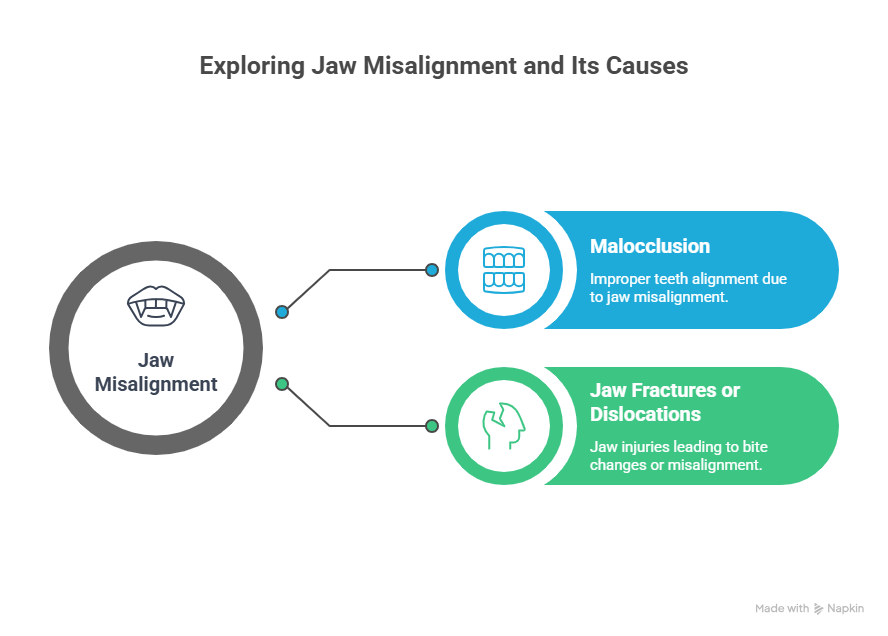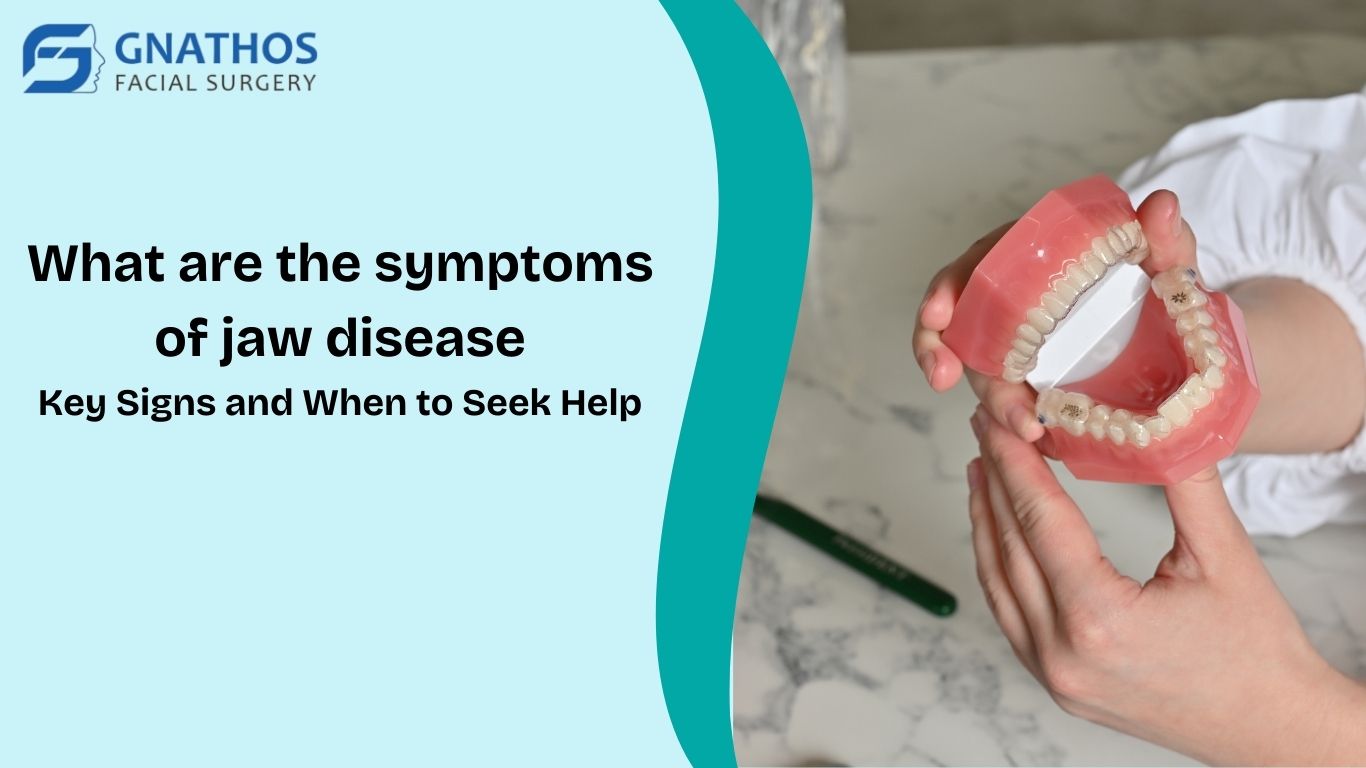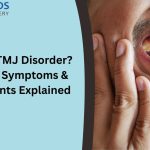Jaw pain can be incredibly uncomfortable and disruptive, affecting your ability to eat, talk, and even smile. When it comes to jaw disease, the symptoms can vary widely depending on the underlying condition. While many people experience mild discomfort in their jaw, it’s essential to recognize when the symptoms are signs of something more serious. If you’ve been dealing with persistent jaw pain or discomfort, you might be wondering, what are the symptoms of jaw disease?
In this blog, we will walk you through the common symptoms associated with jaw disease, explore the possible causes, and offer insights on how to address these symptoms effectively. From TMJ disorders to infections and misalignments, we will cover everything you need to know to help you identify and manage jaw disease.
What is Jaw Disease?

“Jaw disease” is a general term that encompasses a wide range of conditions affecting the jawbone, muscles, or the temporomandibular joint TMJ. The TMJ is the hinge that connects your jawbone to your skull, and it plays a vital role in all jaw movements such as speaking, eating, and yawning. Jaw disease can involve the bones, muscles, or the joint itself, and it can lead to pain, stiffness, difficulty moving the jaw, or other discomforts.
Jaw disease includes conditions such as:
- Temporomandibular Joint Disorders (TMJ or TMD)
- Jaw misalignment (malocclusion)
- Jaw infections
- Jaw fractures or dislocations
- Arthritis affecting the jaw joint
- Bruxism (teeth grinding)
- Cysts or tumors in the jaw
Each of these conditions can cause different symptoms, but most involve discomfort or pain in and around the jaw, along with difficulties in jaw movement. Recognizing these symptoms early is crucial to managing jaw disease effectively.
Symptoms of Jaw Disease
The symptoms of jaw disease can vary depending on the condition, but some common signs may include pain, swelling, difficulty moving the jaw, or changes in the way your teeth align. Let’s take a closer look at the symptoms of jaw disease that you should be aware of.
1. Jaw Pain or Tenderness
One of the most common symptoms of jaw disease is pain or tenderness in the jaw. This pain may be persistent or intermittent and can range from mild discomfort to intense throbbing. The pain can also be sharp or dull, and it may radiate to other areas such as the ears, neck, or shoulders.
- TMJ Disorders: If your jaw pain is related to a TMJ disorder, you might experience discomfort in the joint area, just in front of your ear. The pain can worsen when chewing, speaking, or yawning.
- Bruxism (Teeth Grinding): If you grind your teeth at night, you may wake up with jaw pain or tenderness in the morning, often on one or both sides of the jaw.
If the pain is persistent, it’s important to consult with a dentist or healthcare provider to identify the underlying cause.
2. Jaw Stiffness or Limited Mobility
Another sign of jaw disease is stiffness or a limited range of motion in the jaw. You might find it difficult to fully open or close your mouth, which can interfere with eating, speaking, and other daily activities.
- TMJ Disorders: TMJ disorders often cause a sensation of stiffness in the jaw, particularly in the morning. This can make it harder to open your mouth wide or chew certain foods.
- Jaw Misalignment (Malocclusion): If your teeth are misaligned or your bite doesn’t fit properly, it can cause the jaw to lock or feel stiff.
If you experience limited mobility, you should seek advice from a dentist or a specialist in jaw conditions to help improve function.
3. Jaw Clicking, Popping, or Grating Sounds
You may notice a clicking or popping sound in your jaw, particularly when you open or close your mouth. These sounds can be accompanied by pain or discomfort.
- TMJ Disorders: Clicking and popping sounds are classic signs of TMJ disorder. This happens when the jaw joint doesn’t move smoothly due to damage or inflammation in the joint or surrounding muscles.
- Arthritis: In some cases, arthritis in the jaw can cause a grating or popping sound due to the degeneration of cartilage in the joint.
If you hear these sounds frequently and they are accompanied by pain or discomfort, it’s important to see a healthcare provider to assess the cause.
4. Headaches or Migraines
Headaches, especially tension-type headaches or migraines, can sometimes be a symptom of jaw disease. TMJ disorders, in particular, are often linked with chronic headaches or migraines because the jaw muscles are closely connected to the muscles of the head and neck.
- Referred Pain: Jaw pain can radiate to the head, causing tension headaches or even severe migraines. This is especially common in people who clench or grind their teeth at night.
- Neck and Shoulder Pain: Jaw problems can also contribute to neck and shoulder pain due to muscle tension, which can further exacerbate headache symptoms.
If you are experiencing frequent headaches along with jaw pain, this could indicate a jaw-related issue that requires attention.
5. Ear Pain or Ringing (Tinnitus)
Ear pain or a sensation of fullness in the ear, often referred to as ear congestion, is a common symptom of jaw disease. This occurs because the TMJ is located very close to the ear, and issues with the joint can affect the nearby structures.
- TMJ Disorders: TMJ issues can cause ear pain, a feeling of fullness in the ear, or even tinnitus (ringing in the ears). The pain may be more pronounced on one side of the face.
- Sinus Problems: Sometimes, a jaw infection can lead to ear pain if the infection spreads to the sinuses.
If ear pain is accompanied by jaw pain, it’s important to check for TMJ issues or other jaw-related problems.
6. Teeth Grinding or Jaw Clenching (Bruxism)
Bruxism, or the unconscious grinding of teeth, often occurs during sleep, but it can also happen during the day due to stress or anxiety. The constant grinding or clenching can put excessive pressure on the jaw and lead to pain or discomfort.
- Symptoms of Bruxism: People who grind their teeth often wake up with sore teeth or jaw muscles. You may also notice flattened, chipped, or worn-down teeth over time.
- Jaw Muscle Fatigue: Constant clenching or grinding can cause jaw muscle fatigue, leading to pain in the jaw, neck, and shoulders.
If you experience jaw pain or other symptoms of bruxism, consider speaking to a dentist about treatment options such as a night guard.
7. Facial Swelling or Tenderness
Infections or inflammation in the jaw can cause visible swelling or tenderness around the affected area. This is often associated with conditions like jaw abscesses or TMJ disorders.
- Jaw Infections: An untreated dental infection, such as an abscessed tooth, can cause swelling and tenderness in the jaw. The area may feel warm to the touch.
- TMJ Inflammation: Inflammation of the TMJ can cause swelling around the joint, which may make the jaw appear swollen on one side.
If you experience swelling that doesn’t go away or increases over time, it’s important to get medical attention to prevent complications.
8. Changes in Bite or Tooth Alignment

If you notice that your teeth no longer fit together properly, or your bite feels different, it may indicate jaw disease. Misalignment of the jaw can cause significant discomfort and may require treatment.
- Malocclusion: This is a condition where the upper and lower teeth do not align properly. This can be caused by jaw misalignment, teeth grinding, or trauma to the jaw.
- Jaw Fractures or Dislocations: In rare cases, a jaw injury can cause a change in bite or misalignment.
If your bite feels off or your teeth no longer fit together correctly, it’s important to consult a dentist for further evaluation.
When to Seek Help
If you experience any of the symptoms of jaw disease mentioned above, it’s important to seek help as soon as possible. In some cases, jaw problems can be managed with simple lifestyle changes, while others may require medical or dental intervention. You should consult with a healthcare provider if you experience any of the following:
- Persistent or worsening pain
- Difficulty opening or closing your mouth
- Swelling or redness around the jaw
- Chronic headaches or ear pain
- A noticeable change in your bite or tooth alignment
A dentist or doctor specializing in jaw-related issues can help determine the cause of your symptoms and recommend the most appropriate treatment.
FAQs
What are the symptoms of jaw disease?
The symptoms of jaw disease can include jaw pain, clicking or popping sounds, headaches, ear pain, teeth grinding, facial swelling, and changes in bite. These symptoms may vary depending on the underlying condition.
How do I know if I have a TMJ disorder?
If you experience pain in the jaw, clicking or popping sounds, difficulty opening your mouth, or headaches, you might have a TMJ disorder. A dentist can perform tests to diagnose TMJ.
Can jaw disease cause ear pain?
Yes, jaw disease, especially TMJ disorders, can cause ear pain because the TMJ is located near the ear. Jaw problems can lead to discomfort and a feeling of fullness in the ear.
What causes jaw disease?
Jaw disease can be caused by a variety of factors, including teeth grinding, jaw misalignment, injuries, infections, arthritis, and stress.
How is jaw disease treated?
Treatment for jaw disease depends on the condition but may include physical therapy, pain management, oral appliances like night guards, or surgery in more severe cases. Your dentist or doctor will guide you through the best treatment options based on your symptoms.
Conclusion
Recognizing the symptoms of jaw disease early on is crucial to managing and treating the condition before it leads to more serious issues. If you’re experiencing persistent jaw pain, difficulty moving your mouth, or other related symptoms, it’s important to seek professional help to diagnose and treat the underlying cause. Whether it’s a TMJ disorder, teeth grinding, or jaw misalignment, there are many effective treatments available to help relieve discomfort and improve your quality of life.
At Gnathos Face, we specialize in diagnosing and treating jaw-related issues to help you achieve better oral health and overall well-being. If you’re dealing with jaw pain or other symptoms, don’t hesitate to reach out to us for expert advice and care. Visit Gnathos Face to schedule a consultation today!












